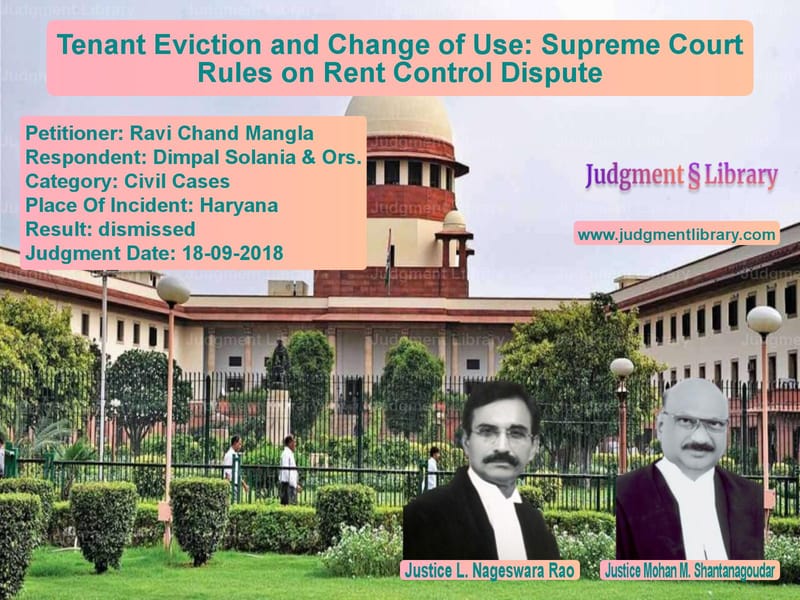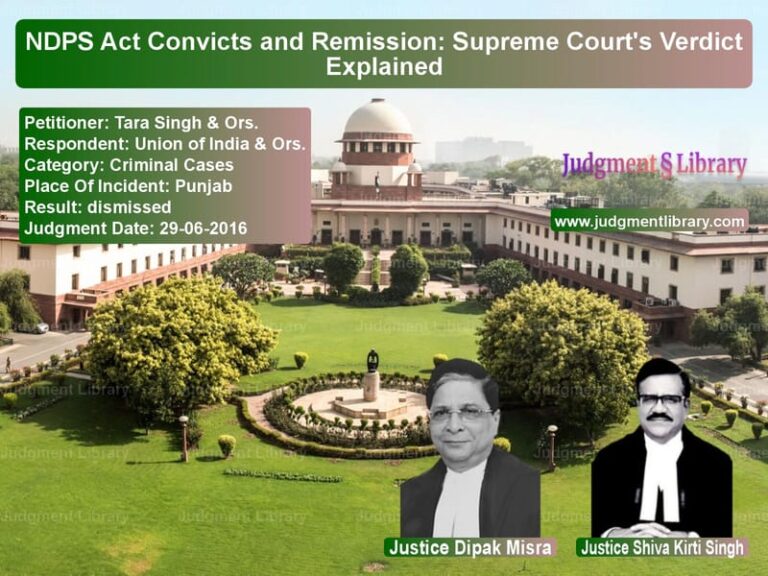Tenant Eviction and Change of Use: Supreme Court Rules on Rent Control Dispute
On 18th September 2018, the Supreme Court of India delivered a critical judgment in Ravi Chand Mangla v. Dimpal Solania & Ors., addressing the issue of tenant eviction under the Haryana Urban (Control of Rent and Eviction) Act, 1973. The case revolved around the landlord’s right to evict a tenant based on change of use of the rented premises and non-payment of rent.
The Supreme Court upheld the decisions of the Rent Controller, Appellate Authority, and the Punjab and Haryana High Court, ruling in favor of the tenants. The judgment clarified that if the rental agreement does not prohibit a particular use, the tenant’s business activities cannot be deemed illegal or grounds for eviction. Additionally, it reaffirmed that non-payment of rent must be specifically challenged at each stage to be considered a valid ground for eviction.
Background of the Case
The appellant, Ravi Chand Mangla, is the landlord of the disputed property, which was rented out on 4th January 1957 at a monthly rent of 58.26 paisa. In 1989, he filed an eviction petition under Section 13 of the Haryana Urban (Control of Rent and Eviction) Act, 1973, alleging:
- The tenants had defaulted in paying rent for 60 months.
- The first respondent had sub-let the premises to respondents 2 and 3.
- The tenants had made alterations that impaired the value and utility of the property.
- The tenants had created a nuisance in the neighborhood.
- The tenants had changed the use of the property, which was initially let out for a sawmill but was now being used for manufacturing grills.
The **Rent Controller** dismissed the petition, and this decision was upheld by both the **Appellate Authority** and the **Punjab and Haryana High Court**. The landlord then approached the Supreme Court.
Legal Issues and Key Questions
The Supreme Court considered the following key issues:
- Was the tenant guilty of non-payment of rent, warranting eviction?
- Did the tenant sub-let the premises without the landlord’s consent?
- Had the tenants altered the property in a way that reduced its utility?
- Did the tenant’s activities amount to a **nuisance** to the neighborhood?
- Did the change from **sawmill operations to manufacturing grills** constitute an unlawful change of use, making eviction justified?
Arguments by the Appellant (Ravi Chand Mangla – Landlord)
The landlord’s counsel argued:
- The tenant had **not paid rent for 60 months** and was in default.
- The **sub-letting of premises** was evident from the presence of additional occupants running a business.
- The tenants had **changed the purpose of the tenancy** from a sawmill to manufacturing grills without permission.
- The **manufacturing of grills caused pollution and noise**, creating a nuisance for the neighborhood.
- Alterations made to the property **reduced its utility and value**.
Arguments by the Respondents (Tenants)
The tenants, represented by their legal counsel, countered:
- They had **cleared all arrears of rent** before the Rent Controller’s decision, eliminating grounds for eviction on this count.
- The **rental agreement did not restrict** them to operating only a sawmill; it allowed for any business activity.
- There was **no evidence of sub-letting**, as all business operations were being run under the same ownership.
- The landlord had raised the **nuisance and alteration claims without substantial evidence**.
- They would lose their livelihood if evicted without valid grounds.
Supreme Court’s Observations
The Supreme Court, comprising **Justice L. Nageswara Rao and Justice Mohan M. Shantanagoudar**, closely examined the findings of the lower courts.
On **non-payment of rent**, the Court held:
“The arrears of rent had been paid prior to the Rent Controller’s decision, and the landlord did not challenge this issue before the Appellate Authority. Hence, it cannot be raised at this stage.”
On **change of use**, the Court observed:
“The rental agreement permitted the tenants to conduct any business. In the absence of a restrictive clause, the shift from sawmill operations to manufacturing grills does not constitute an unauthorized change of use.”
On **sub-letting and nuisance**, the Court found:
“There is no evidence proving sub-letting or that the tenants’ business operations caused any significant disturbance to the neighborhood.”
Final Judgment
The Supreme Court upheld the High Court’s ruling and dismissed the landlord’s appeal, stating:
“There are no valid grounds for eviction. The appeal is dismissed.”
Impact of the Judgment
This ruling reaffirms key principles in **rent control and tenant rights** under Indian law. The judgment emphasizes that:
- **Non-payment of rent must be continuously challenged** at every legal stage to remain a valid eviction ground.
- **Change of use is not illegal unless explicitly restricted in the rental agreement.**
- **Landlords must provide concrete evidence** of sub-letting, property damage, or nuisance to justify eviction.
- **Eviction laws favor tenants**, requiring landlords to meet a high burden of proof.
The ruling strengthens tenant protections, ensuring that landlords cannot evict occupants arbitrarily based on loosely defined allegations.
Petitioner Name: Ravi Chand Mangla.Respondent Name: Dimpal Solania & Ors..Judgment By: Justice L. Nageswara Rao, Justice Mohan M. Shantanagoudar.Place Of Incident: Haryana.Judgment Date: 18-09-2018.
Don’t miss out on the full details! Download the complete judgment in PDF format below and gain valuable insights instantly!
Download Judgment: Ravi Chand Mangla vs Dimpal Solania & Ors Supreme Court of India Judgment Dated 18-09-2018.pdf
Direct Downlaod Judgment: Direct downlaod this Judgment
See all petitions in Landlord-Tenant Disputes
See all petitions in Property Disputes
See all petitions in Specific Performance
See all petitions in Judgment by L. Nageswara Rao
See all petitions in Judgment by Mohan M. Shantanagoudar
See all petitions in dismissed
See all petitions in supreme court of India judgments September 2018
See all petitions in 2018 judgments
See all posts in Civil Cases Category
See all allowed petitions in Civil Cases Category
See all Dismissed petitions in Civil Cases Category
See all partially allowed petitions in Civil Cases Category







